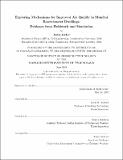Exploring mechanisms for improved air quality in Mumbai resettlement dwellings : evidence from fieldwork and simulation
Author(s)
Lueker, Justin(Justin David)
Download1135858448-MIT.pdf (32.48Mb)
Other Contributors
Massachusetts Institute of Technology. Department of Architecture.
Advisor
Leslie K. Norford and Ronita Bardhan.
Terms of use
Metadata
Show full item recordAbstract
In megacities like Mumbai, rapid urban migration has driven over half the population to reside in informal settlements known as "slums." The local government seeks more efficient use of scarce land and a higher standard of living for slum dwellers by resettling them in permanent multistory structures. However, existing resettlement schemes result in environmental conditions that are often no better than the places from which people were located, with dense clusters of high-rise buildings being referred to as "vertical slums." Thus it is essential to base design decisions on evidence-driven consideration of indoor and outdoor environmental quality. This project involves a measurement, simulation, and engagement campaign that focuses on one important element of sustainable design, household air pollution, an issue described as the most prevalent environmental risk factor worldwide. Household surveys revealed occupant behavior patterns and aesthetic preferences while a measurement campaign informed the primary pollution sources and the relationship between architecture and pollution exposure. While acknowledging the unique project constraints for the slum resettlement context, we identify air quality improvement mechanisms that are resource-efficient, scalable, and culturally sensitive. By strategically applying these mechanisms in tandem, the simulations suggest that passive strategies alone can reduce annual average pollution exposure by more than 95% for household occupants. Future efforts will include a trial application of proposed design alternatives in an occupied Mumbai apartment, as well as presentation of results to NGO partners and municipal housing authorities. Ultimately, this project seeks to motivate the addition of environment- and health-centric design practices to the architectural specifications of low-income residential projects in cities like Mumbai.
Description
This electronic version was submitted by the student author. The certified thesis is available in the Institute Archives and Special Collections. Thesis: S.M. in Building Technology, Massachusetts Institute of Technology, Department of Architecture, 2019 Cataloged from PDF version of thesis. Includes bibliographical references (pages 108-124).
Date issued
2019Department
Massachusetts Institute of Technology. Department of ArchitecturePublisher
Massachusetts Institute of Technology
Keywords
Architecture.